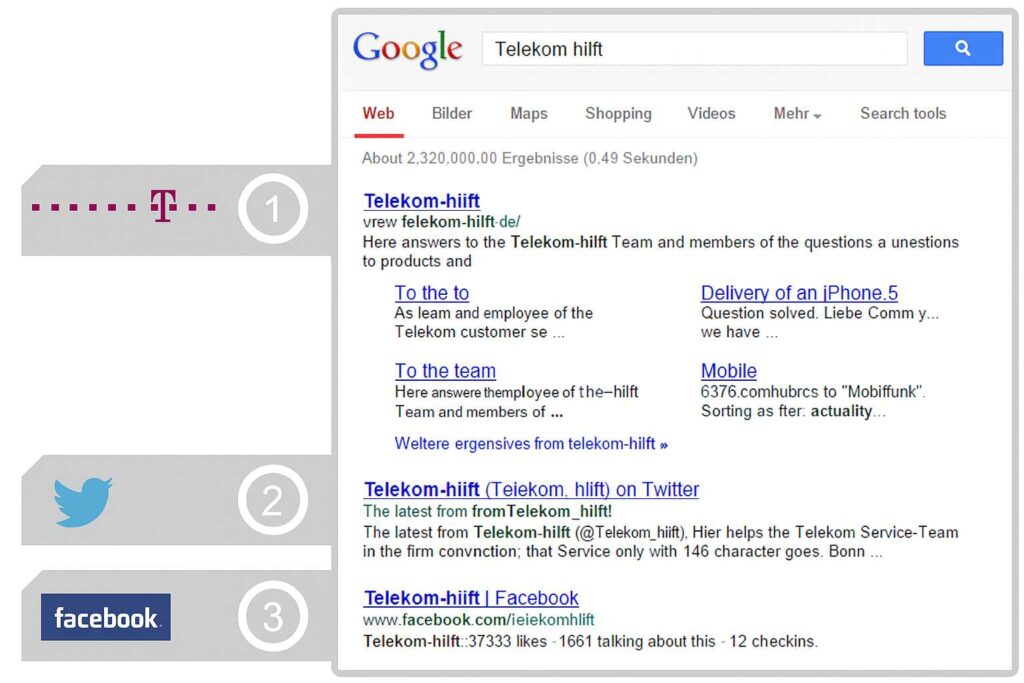This provocative and seemingly contradictory statement has already rallied a host of critics on the web against Wikipedia. However, the criticism is not primarily about the knowledge itself or the content found on Wikipedia, but rather about its technical structure. To understand whether this criticism is justified, we need to look back at the development of the internet from a particular perspective.
However, continuous user participation and activity are essential prerequisites. The more posts and volume a forum has, the higher it rises in the esteem of search engines. If the content is also being continuously updated, the most important criteria for search engine ranking are essentially fulfilled.
Since the most recent and relatively good updates from Google, spam forums hardly stand a chance of ranking anymore. Just a few years ago, spammers were still able to exploit this area quite effectively, using specialized tools to automatically fill forums with random content. This tricked search engines into thinking the platform was highly active and frequently updated. These kinds of forums were eventually exposed because search engines continuously improved their linguistic capabilities. Google, for instance, can now very effectively determine whether a text consists of merely strung-together nonsense or actual comments with grammatical coherence. Today, complex clustering methods are also used — meaning Google identifies whether a website as a whole is dedicated to a specific topic and builds a kind of pattern. Essentially, Google creates an overall picture of a website. These “patterns” are also compared with other websites, and similarities are highlighted. If a website shows strong similarities with known spam sites, the search engine quickly recognizes it as spam.
Therefore, companies can’t avoid creating a genuine, functioning forum if they want to use it for successful SEO. SEO has two areas of application:
Forum as SEO Support
In this case, a company builds a forum to support its other channels. For example, a website can be supplemented with a forum to generate more traffic, branding, and reputation.
SEO for a Standalone Forum
Here, the forum itself is the product, and SEO is applied directly to it. Some forums have their own business model. In this case, traffic isn’t always the only decisive factor — conversions also matter.
SEO Power of Forums
Active forums are generally ranked very well naturally. However, it’s often overlooked that large and established forums have also undergone an SEO process. Often, SEO research and audits are already performed during the selection of forum categories to ensure their success and visibility in search engines.
That’s why forums are often referred to as the supreme discipline of SEO (see also p. 32 in the magazine). In short: forums can work real SEO miracles… and SEO can work real miracles for forums.
The bad news is that establishing a successful free forum is very difficult. Only a few companies succeed in maintaining a free forum with active user participation over a longer period. Often, companies fall into a vicious cycle right from the start: typically, a newly launched forum has very few members. If participation remains low and average response times are consistently long, there is no growth. In such cases, the forum quickly dies out and becomes a ghost on the edge of the web. It’s clear that among all social media channels, forums have the highest barrier to success.
Another Aspect of Forums’ SEO Strength: Product Discoverability
Most users encounter information about specific products in forums faster than anywhere else, because forums often rank high in search engine results. This search-engine-supported influence of forums is often underestimated — or even completely overlooked — by companies. Especially companies monitoring their online reputation, for example through social media monitoring, often wrongly focus on sources like Facebook or Twitter. Yet over 80% of internet users use search engines to find desired content — and thus land on forum posts. In such cases, companies lack either expertise or a proper social media audit, usually provided by professional monitoring service providers. The most innovative Facebook campaign, the most active Twitter account, and the best-looking corporate blog won’t help if a potential customer reads in a forum — from experienced users — that the product is prone to failure.
Using Social Networks
Another idea for establishing a forum is linking it to a social network like Facebook Groups or Xing. These platforms already offer forum-like infrastructure. Members can quickly and easily create a discussion platform and bring a community to life without major investment. This form of community-building can be interesting for starting small interest groups. But from an SEO perspective, these forums offer little to no benefit. Most of them are only accessible to members and are located in the part of the web that search engines can’t crawl — known in technical jargon as the Deep Web. Content from the Deep Web doesn’t appear in general search results. Therefore, such forums are only interesting for their internal members.
The widespread belief about free forums is that they’re mainly consumed by their active members. But that’s actually not the case. The largest readership of such forums consists of users who stumble upon forum content via search engines and then read up on certain topics. Very few users actually participate in discussions, whereas click rates for posts can skyrocket in a short time. The stats speak for themselves: posts with contributions from over 100 different authors and more than 400 replies can get up to 20,000 visits. This means about 99.5% of users just read forum content, often without even being members, while only 0.5% actively contribute to discussions. Free forums, in contrast to those within social networks, therefore have a clear advantage.

Additionally, a company that does not operate its own independent forum but instead relies on the functions of a network has very limited advertising and control options. In Facebook Groups, forum operators are inevitably forced to watch as outside companies use the platform for their own advertising—and naturally lure away their own target audience to some extent. Promotional campaigns, applications, as well as special and custom features, cannot be implemented because only the infrastructure provided by the network is available. Establishing landing pages within forums or redesigning them technically or visually is also hardly possible or not worthwhile. Therefore, using third-party forum structures within a social network is not suitable for SEO purposes. At best, this can be seen as internal SEO—meaning that a Facebook Group can only be found and used within the world of Facebook itself. It’s a kind of “Facebook Search Optimization” rather than real search engine optimization. The same principle applies to networks like Xing, LinkedIn, and many others. The masses simply aren’t reached.
Marketing in Forums
It is not unreasonable for companies to participate in independent forums. In principle, this kind of forum engagement is an essential and important component of social media marketing. However, it is considered a specialized discipline and requires specific knowledge and processes to avoid damaging the company’s reputation. Under no circumstances should such participation be undertaken without the guidance of a professional and experienced service provider.
Forum engagement, for example, requires open and transparent communication, contact with forum administrators, clear guidelines regarding topics and tone, and a trained team—just to name a few essential points. Companies like Symantec (as reported in the Social Media Magazine issue 2011-II, “Service 2.0: Engagement in Forums”), Versatel, and Deutsche Telekom (see page 32) have already successfully implemented forum engagements in the past.
Generally, forum engagement puts typical service thinking into action. As a result, forum communities usually gain not only awareness that the company is present but also benefit from competent support and interesting updates. These efforts help support target groups, clear up rumors, and resolve confusion. Nonetheless, this kind of social media engagement does not fall under SEO.
Forum SEO
When it comes to SEO, strong engagements can actually benefit the company more than conventional service-oriented participation. The first step is identifying top discussion topics in forums related to the company’s products, which provides key insights into what’s being talked about most often. In the construction industry, for example, these topics might include heating costs or bank loans. Many of these discussions recur frequently and are evergreen in nature—no matter how often they’ve already been discussed, new threads continually emerge.
Naturally, users of search engines also look for precisely these topics and often find relevant and helpful contributions in forums. Unfortunately, it doesn’t help companies much to present this information as a kind of FAQ on their websites—because they simply can’t compete with the search engine rankings of hundreds of forums, and so they go unnoticed.
In such cases, there are various ways companies can gain visibility within forums through active participation. Crucial to this is using the right tone and contributing in a way that supports SEO objectives. When users find forums via search engines, they’ll also come across the company’s contributions. This kind of SEO relies on using external platforms, i.e., existing forums. Rather than trying to outrank high-powered forums, companies integrate themselves directly into the forums and become part of the community.
However, as already mentioned, this can only be done successfully with the help of a professional and reputable social media agency or monitoring service.
The optimum scenario is when a company manages to establish its own forum, over which it has complete control. But only a few companies have achieved this. A few years ago, the grocery discounter Globus tried to launch its own forum and failed due to low user activity. In contrast, Sony succeeded—after much effort—in establishing a forum for DSLR cameras. This was only possible because Sony was one of the first movers in that space at the start of the DSLR trend. More recently, Deutsche Telekom also succeeded in operating one of the largest communication forums in Germany. But these are rare examples.
It’s estimated that over 90% of companies fail in their attempt to create an independent forum, often because they underestimate the complexity. In fact, most successful forums today were launched by individuals, or the forum is the core product of the company itself. One example is Gofeminin, the largest German forum for women, run by gofeminin.de GmbH.
In cases like these, partnerships or advertising placements within established forums are more advisable. A well-placed banner ad in the right forum can sometimes be the best SEO strategy. The approach doesn’t have to be innovative—what matters is measurable results. This is a fact often overlooked in social media engagement strategies.


 by
by 

